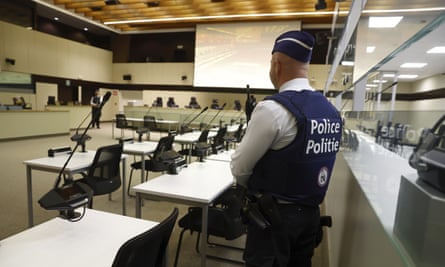Trial of 10 defendants in 2016 Brussels terror attack begins Monday | Brussels attacks
Ten men will stand trial accused of playing a role in the 2016 Brussels terror attacks that killed 32 people and injured hundreds in what was Belgium’s worst peacetime atrocity.
The trial, which is taking place in a specially built court in the former NATO headquarters in the north of the Belgian capital, opens on Monday, more than six and a half years after the attacks on Brussels airport and Maelbeek metro station on March 22, 2016.
Among the 10 defendants are Salah Abdeslam, who was found last year guilty of murder and sentenced to life imprisonment in separate legal proceedings for his role in the 2015 Paris attacks, which killed 130 people and injured more than 490. Abdeslam is among five defendants who have been convicted in France for the Paris attacks.
Also on the dock in Belgium is Mohamed Abrini, who is believed to be the ‘man in the hat’ filmed with two suicide bombers who blew themselves up in the Brussels airport bombing. Prosecutors say Abrini left a bomb in the departure hall and fled.
Abrini, who admitted driving bombers to the scene of the Paris attacks, was last year life sentence with a minimum sentence of 22 years for his role in the shooting in the French capital.
Another defendant, Osama Krayem, had planned to be a suicide bomber on the subway but changed his mind at the last minute, one of his former lawyers said in 2016. One of the defendants, Osama Atar, will be tried in absentia. He was reportedly killed in Syria in 2017.
The first week of the trial will be dominated by the reading of the charges against the defendants. The case will be heard by a jury of seven women and five men selected last week by lot from a pool of 1,000 people. 24 other substitute jurors are ready to take their place in case of absence.
The trial is expected to last six to nine months and will hear from hundreds of survivors and witnesses, including experts in medicine, psychiatry and criminology. From mid-January, the victims of the attacks will have the opportunity to express themselves in court.
Philippe Vandenberghe was working at Brussels Zaventem airport when two suicide bombers detonated their devices in the terminal. He immediately went to help people. “A chance to save lives is the most important thing that can happen,” he said in a recent interview. “I intervened on 18 different people, I’m sure I saved one, probably two or three.”
He recalled victims who had lost limbs, as well as two children who lay next to a lifeless body – “probably their mother”. He tried to resuscitate the woman but it was too late.
After being treated for post-traumatic stress disorder at a specialist clinic, Vandenberghe quit his job at the airport in 2019. “My life was completely destroyed, I lost my friends, my hobbies, my job” , Vandenberghe told AFP. He now volunteers with the Red Cross and hopes to become a paramedic.
Jaana Mettala, a Swedish national, was six and a half months pregnant when she was traveling on the metro which was bombed in the second attack. Speaking to Belgian television, she said the trial was part of the recovery process and it was important to share what she had been through. “A long time has already passed in people’s minds. I think it is important to share the consequences [for victims].”
Mettala stayed in the hospital for four months and gave birth to a healthy daughter. She campaigned for her child to be recognized as a victim of the attack.

Valérie Gérard, a lawyer representing the victims, said many felt abandoned by the state. “The time that has passed since the events has weakened them, they have suffered a loss of confidence.” First responders, police and rescuers had had no acknowledgment of support, Gerard added.
Gérard is one of the 14 lawyers representing pro bono nearly 300 people who filed a civil complaint during the trial, via the association Life4Brussels, created to help the victims of the attacks of March 22.
In 2017, the organization successfully lobbied for a change in the law to guarantee a lifelong recovery pension and reimbursement of medical care to victims of the Brussels attacks. But some have missed the three-year window to benefit from these provisions, as they say they have found the bureaucracy traumatizing.
The trial, the most expensive in Belgian history, was delayed for weeks after a judge ordered the glass box that will hold the defendant to be reworked. Defendants will be seated together in one box rather than separate booths, after the presiding judge ruled the original provision limited their ability to communicate with their lawyers.


Comments are closed.